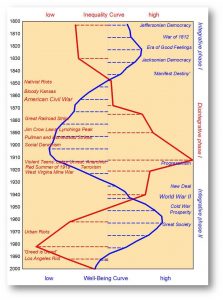Tag: efficiency
Bi-Weekly Geopolitical Podcast – #13 “The Pandemic’s Impact on Inequality” (Posted 7/18/22)
Weekly Geopolitical Report – Revisiting Scheidel’s Horsemen: Part III (May 4, 2020)
by Bill O’Grady
In Part I of this report, we discussed Scheidel’s thesis on the events that reverse the normal trend of inequality and used this analysis to frame the COVID-19 pandemic. In Part II, we introduced the equality/ efficiency cycle and discussed the first issue that would be affected by a shift to equality. In this final Part III of the report, we will address the other four issues, discuss inflation and conclude with market ramifications.
Weekly Geopolitical Report – Revisiting Scheidel’s Horsemen: Part II (April 27, 2020)
by Bill O’Grady
In Part I, we introduced Walter Scheidel’s four horsemen and examined the impact of COVID-19 using his framework.[1] This week, we introduce the equality/ efficiency cycle and discuss the first issue that would be affected by the reversal of this cycle.
COVID-19 and the Equality/Efficiency Cycle
We postulate that economies pass through cycles of equality and efficiency. We developed this concept based on the seminal work of three scholars. The first strand is the idea of the equality/efficiency tradeoff, which comes from Arthur Okun.[2] He argued that societies face a tradeoff between equality and efficiency. Efficiency is necessary for growth, while equality is required for political and social stability. However, there is no evidence that Okun saw this tradeoff as a cycle; instead, he saw it as two competing forces to be constantly balanced.
The second source of our postulate is from Peter Turchin, who suggested that countries cycle between periods of greater or lesser equality. In the following chart, Turchin shows this cycle in the U.S. from the early 1800s to 2000. Measuring inequality (red line) is a simple calculation that originated with Kevin Phillips. It is the ratio of the largest fortune in the U.S. relative to average household wealth. The well-being line (blue line) is the detrended and log-transformed level of social optimism, which is the average age of marriage, along with the wages of production workers divided by per-capita GDP, life expectancy and average height. The chart shows that well-being is inversely correlated to inequality.

The third source of our thesis comes from Walter Scheidel, who suggests that efficiency cycles are the norm due to the power of capital. Efficiency continues until it is stopped by one of four major disruptions: mass mobilization war, revolution, societal collapse or pandemic.
Therefore, our thesis is the following:
- Societies face a tradeoff between equality and efficiency.
- This tradeoff leads to cycles in which the goals of one or the other dominate.
- The natural course is for efficiency to dominate because capital tends to accumulate economic and political power over time.
- What reverses the dominant trend is a cataclysmic event, i.e., mass mobilization war, revolution, collapse of social order, pandemic.
- What reverses an equality cycle is persistent inflation, which is usually supported by equality policies of trade impediments, immigration control and regulation.
[1] Scheidel, Walter. (2017). The Great Leveler: Violence and the History of Inequality from the Stone Age to the Twenty-First Century. Princeton, NJ: Princeton University Press.
[2] Okun, Arthur. (1975). Equality and Efficiency: The Big Tradeoff. Washington, D.C.: Brookings Institution Press.
Weekly Geopolitical Report – Reflections on Trade: Part IV (May 22, 2017)
by Bill O’Grady
(Due to the Memorial Day holiday, our next report will be published on June 5.)
This is the final report of our four-part series on trade. This week, our discussion on trade continues with a look at the relationship between trade, employment and inflation. We will also conclude the series with market ramifications.
What are the tradeoffs of trade?
Trade is part of a broader societal tradeoff between equality and efficiency.[1] To function, societies need some degree of both. Nations with a high level of inequality tend to become politically unstable. At the same time, perfect equality tends to stifle initiative and prevent the building of productive capacity. Efficiency helps an economy provide goods and services at reasonable costs. Complete inefficiency makes everyone poor.
Okun’s insight is that societies balance equality and efficiency to maintain order. What we observe in history is that there doesn’t appear to be a balance point; in other words, this isn’t an optimization problem. Instead, we see broad periods of oscillation where one goal or the other is waxing or waning.
___________________________________
[1] Okun, A. (1972). Equality and Efficiency: The Big Tradeoff. Washington, D.C.: Brookings Institute.


